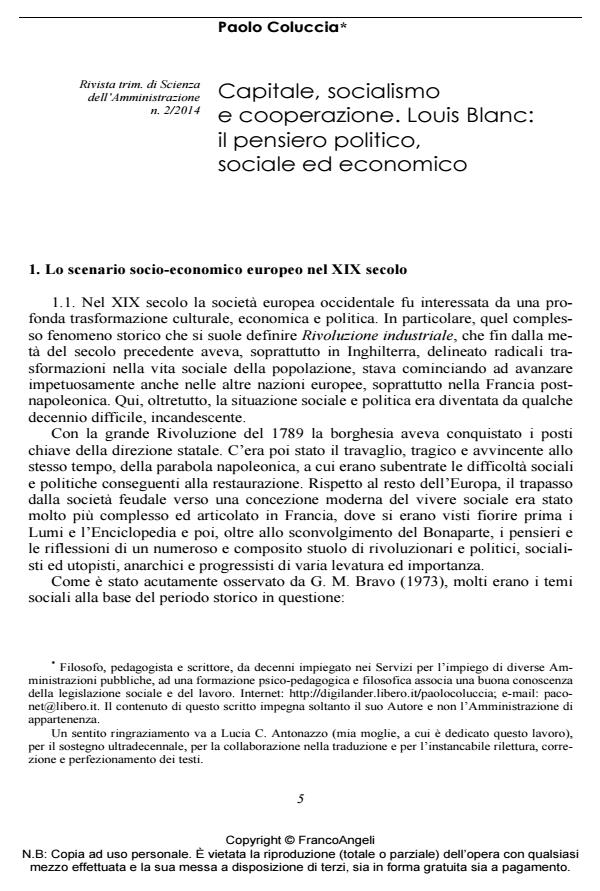Capital, socialism and cooperation. Louis Blanc: political, social and economic thought
Journal title RIVISTA TRIMESTRALE DI SCIENZA DELL’AMMINISTRAZIONE
Author/s Paolo Coluccia
Publishing Year 2014 Issue 2014/2
Language Italian Pages 38 P. 5-42 File size 1016 KB
DOI 10.3280/SA2014-002001
DOI is like a bar code for intellectual property: to have more infomation
click here
Below, you can see the article first page
If you want to buy this article in PDF format, you can do it, following the instructions to buy download credits

FrancoAngeli is member of Publishers International Linking Association, Inc (PILA), a not-for-profit association which run the CrossRef service enabling links to and from online scholarly content.
The Industrial Revolution outlined radical changes in the social life of the population. People had passed in a very short time from a feudal-agrarian production system to another based on the use of machines and the exploitation of resources and of human beings. To the violence and abuse that followed, people answered with fights and revolts. The working class was born and the workers’ move ment, which was based on a workers’ thought, took shape. Work became the constitutive structure of life of the worker. Louis Blanc pursued throughout his life utopian ideas of reform and social liberation, based on democracy and socialism, economic cooperation and institutional cooperation. The book The Organization of work made him famous: 10 editions from 1839 to 1848. He proposed the principles of partnership and cooperation, inspired by the institutional action of the State. He fought for the creation of social workshops and the Ministry of Labour. Blanc was opposed by everyone: intellectuals, socialists, politicians, industrialists and economists. But he never dropped out of his ideas. In an era of crisis and social misery, Louis Blanc always turned his attention especially to the poor, the emarginated and the exploited people. His ideas about work organization had non only materialistic goals, but they were closely linked to the spirituality and dignity of every human being. This is a thought that need to be studied even today, in another era of crisis, different and complex, that still generates misery and poverty.
Keywords: Crisis, poverty, work
- Engels F. (1955). Situazione della classe operaia in Inghilterra. Roma: Editori Riuniti.
- Engels F. (1974). Anti-Dühring. Roma: Editori Riuniti.
- Löwith K. (1949). Da Hegel a Nietzsche. La frattura rivoluzionaria nel pensiero del XIX secolo. Torino: Einaudi.
- Marx K. (1962). La lotta di classe in Francia dal 1848 al 1850. Roma: Editori Riuniti.
- Marx K. (1947). Il 18 brumaio di Luigi Bonaparte. Roma: Edizioni Rinascita.
- Marx K. (2005). Il Capitale. Roma: Newton Compton.
- Marx K. Engels F. (1973). Manifesto del Partito Comunista. Milano: Mursia.
- Polanyi K. (1974). La Grande Trasformazione. Le origini economiche e politiche della nostra epoca. Torino: Einaudi.
- Ragionieri E. (1968). Introduzione. In: Dolléans É. Storia del movimento operaio (1840-1871). Firenze: Sansoni.
- Sbardella E. (2005). Introduzione. In: Marx K. Il Capitale. Roma: Newton Compton.
- Tocqueville (de) A. (1939). Una rivoluzione fallita. Ricordi del 1848-1849. Bari: Laterza
- Bravo G.M. (1966). Storia del socialismo. 1789-1848. Roma: Editori Riuniti.
- Bravo G.M. a cura di (1973). Introduzione. In: Il socialismo prima di Marx: antologia di scritti riformatori. socialisti. utopisti. comunisti e rivoluzionari premarxisti. Roma: Editori Riuniti.
- Cipolla C.M. (1971). Introduzione. In: Deane P. La prima rivoluzione industriale. Bologna: Il Mulino.
- Cipolla C.M. (1973). La Rivoluzione industriale. In AA.VV. Storia economica d’Europa. Torino: Einaudi.
- Cole G.D.H. (1967). Storia del pensiero socialista. I precursori. Bari: Laterza.
- Colombo A. (1997). L’Utopia. Rifondazione di un’idea e di una storia. Bari: Dedalo.
- Deane P. (1973). La Rivoluzione industriale in Inghilterra. In AA.VV. Storia economica d’Europa. Torino: Einaudi.
- Dolléans É. (1968). Storia del movimento operaio (1840-1871). Firenze: Sansoni.
Paolo Coluccia, Capitale, socialismo e cooperazione. Louis Blanc: il pensiero politico, sociale ed economico in "RIVISTA TRIMESTRALE DI SCIENZA DELL’AMMINISTRAZIONE" 2/2014, pp 5-42, DOI: 10.3280/SA2014-002001